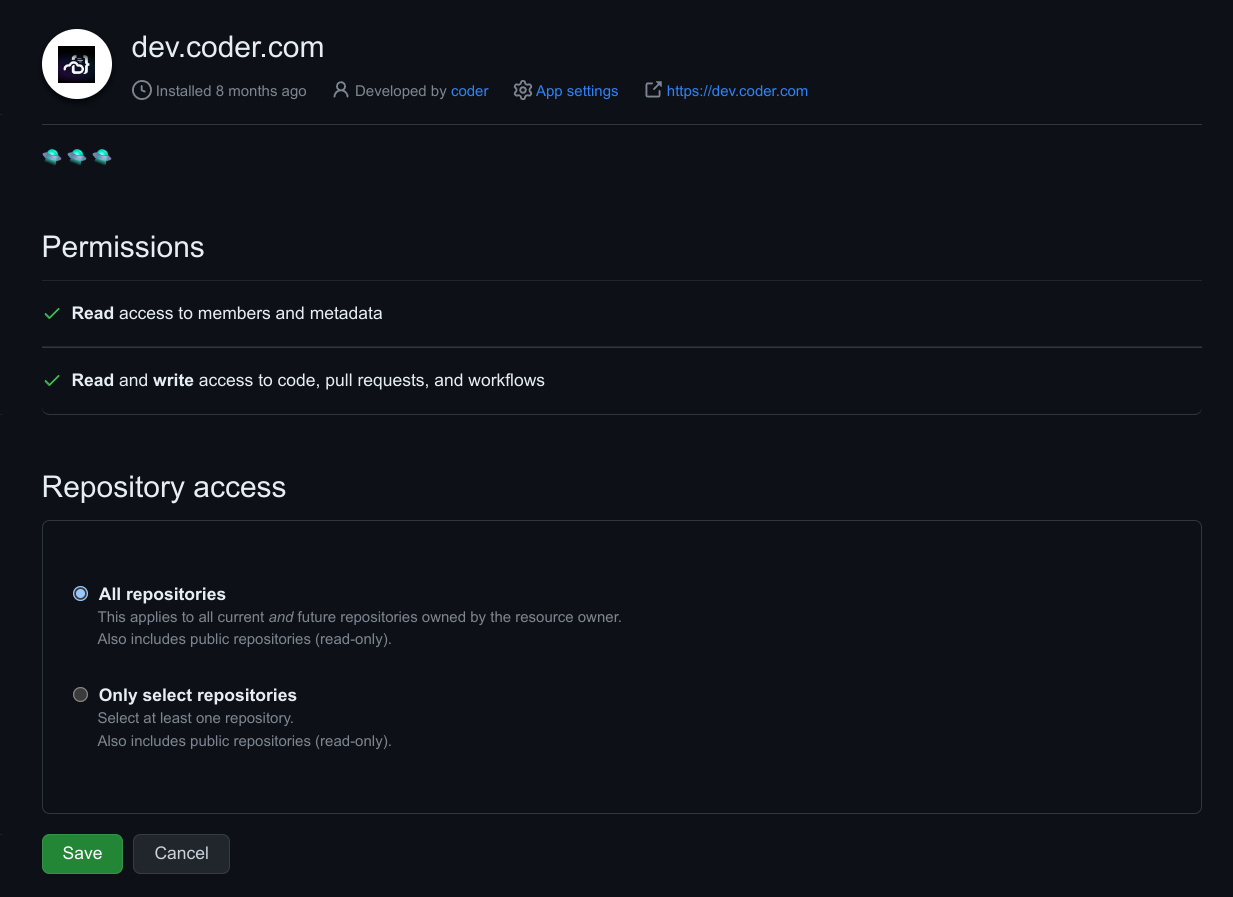External Auth
Coder integrates with Git and OpenID Connect to automate away the need for developers to authenticate with external services within their workspace.
Git Providers
When developers use git inside their workspace, they are prompted to
authenticate. After that, Coder will store and refresh tokens for future
operations.
Configuration
To add an external authentication provider, you'll need to create an OAuth application. The following providers are supported:
Example callback URL:
https://coder.example.com/external-auth/primary-github/callback. Use an
arbitrary ID for your provider (e.g. primary-github).
Set the following environment variables to configure the Coder server:
CODER_EXTERNAL_AUTH_0_ID="primary-github"
CODER_EXTERNAL_AUTH_0_TYPE=github|gitlab|azure-devops|bitbucket-cloud|bitbucket-server|<name of service e.g. jfrog>
CODER_EXTERNAL_AUTH_0_CLIENT_ID=xxxxxx
CODER_EXTERNAL_AUTH_0_CLIENT_SECRET=xxxxxxx
# Optionally, configure a custom display name and icon
CODER_EXTERNAL_AUTH_0_DISPLAY_NAME="Google Calendar"
CODER_EXTERNAL_AUTH_0_DISPLAY_ICON="https://mycustomicon.com/google.svg"
GitHub
-
Create a GitHub App to enable fine-grained access to specific repositories, or a subset of permissions for security.

-
Adjust the GitHub App permissions. You can use more or less permissions than are listed here, this is merely a suggestion that allows users to clone repositories:

Name Permission Description Contents Read & Write Grants access to code and commit statuses. Pull requests Read & Write Grants access to create and update pull requests. Workflows Read & Write Grants access to update files in .github/workflows/.Metadata Read-only Grants access to metadata written by GitHub Apps. -
Install the App for your organization. You may select a subset of repositories to grant access to.

GitHub Enterprise
GitHub Enterprise requires the following environment variables:
CODER_EXTERNAL_AUTH_0_ID="primary-github"
CODER_EXTERNAL_AUTH_0_TYPE=github-enterprise
CODER_EXTERNAL_AUTH_0_CLIENT_ID=xxxxxx
CODER_EXTERNAL_AUTH_0_CLIENT_SECRET=xxxxxxx
CODER_EXTERNAL_AUTH_0_VALIDATE_URL="https://github.example.com/api/v3/user"
CODER_EXTERNAL_AUTH_0_AUTH_URL="https://github.example.com/login/oauth/authorize"
CODER_EXTERNAL_AUTH_0_TOKEN_URL="https://github.example.com/login/oauth/access_token"
Bitbucket Server
Bitbucket Server requires the following environment variables:
CODER_EXTERNAL_AUTH_0_TYPE="bitbucket-server"
CODER_EXTERNAL_AUTH_0_ID=bitbucket
CODER_EXTERNAL_AUTH_0_CLIENT_ID=xxx
CODER_EXTERNAL_AUTH_0_CLIENT_SECRET=xxx
CODER_EXTERNAL_AUTH_0_AUTH_URL=https://bitbucket.domain.com/rest/oauth2/latest/authorize
Azure DevOps
Azure DevOps requires the following environment variables:
CODER_EXTERNAL_AUTH_0_ID="primary-azure-devops"
CODER_EXTERNAL_AUTH_0_TYPE=azure-devops
CODER_EXTERNAL_AUTH_0_CLIENT_ID=xxxxxx
# Ensure this value is your "Client Secret", not "App Secret"
CODER_EXTERNAL_AUTH_0_CLIENT_SECRET=xxxxxxx
CODER_EXTERNAL_AUTH_0_AUTH_URL="https://app.vssps.visualstudio.com/oauth2/authorize"
CODER_EXTERNAL_AUTH_0_TOKEN_URL="https://app.vssps.visualstudio.com/oauth2/token"
Self-managed git providers
Custom authentication and token URLs should be used for self-managed Git provider deployments.
CODER_EXTERNAL_AUTH_0_AUTH_URL="https://github.example.com/oauth/authorize"
CODER_EXTERNAL_AUTH_0_TOKEN_URL="https://github.example.com/oauth/token"
CODER_EXTERNAL_AUTH_0_VALIDATE_URL="https://your-domain.com/oauth/token/info"
CODER_EXTERNAL_AUTH_0_REGEX=github\.company\.org
Note: The
REGEXvariable must be set if using a custom git domain.
Custom scopes
Optionally, you can request custom scopes:
CODER_EXTERNAL_AUTH_0_SCOPES="repo:read repo:write write:gpg_key"
Multiple External Providers
Multiple providers are an Enterprise feature. Learn more. Below is an example configuration with multiple providers.
# Provider 1) github.com
CODER_EXTERNAL_AUTH_0_ID=primary-github
CODER_EXTERNAL_AUTH_0_TYPE=github
CODER_EXTERNAL_AUTH_0_CLIENT_ID=xxxxxx
CODER_EXTERNAL_AUTH_0_CLIENT_SECRET=xxxxxxx
CODER_EXTERNAL_AUTH_0_REGEX=github.com/orgname
# Provider 2) github.example.com
CODER_EXTERNAL_AUTH_1_ID=secondary-github
CODER_EXTERNAL_AUTH_1_TYPE=github
CODER_EXTERNAL_AUTH_1_CLIENT_ID=xxxxxx
CODER_EXTERNAL_AUTH_1_CLIENT_SECRET=xxxxxxx
CODER_EXTERNAL_AUTH_1_REGEX=github.example.com
CODER_EXTERNAL_AUTH_1_AUTH_URL="https://github.example.com/login/oauth/authorize"
CODER_EXTERNAL_AUTH_1_TOKEN_URL="https://github.example.com/login/oauth/access_token"
CODER_EXTERNAL_AUTH_1_VALIDATE_URL="https://github.example.com/api/v3/user"
To support regex matching for paths (e.g. github.com/orgname), you'll need to add this to the Coder agent startup script:
git config --global credential.useHttpPath true
Require git authentication in templates
If your template requires git authentication (e.g. running git clone in the
startup_script),
you can require users authenticate via git prior to creating a workspace:

The following example will require users authenticate via GitHub and auto-clone
a repo into the ~/coder directory.
data "coder_external_auth" "github" {
# Matches the ID of the external auth provider in Coder.
id = "github"
}
resource "coder_agent" "dev" {
os = "linux"
arch = "amd64"
dir = "~/coder"
env = {
GITHUB_TOKEN : data.coder_external_auth.github.access_token
}
startup_script = <<EOF
if [ ! -d ~/coder ]; then
git clone https://github.com/coder/coder
fi
EOF
}
See the Terraform provider documentation for all available options.


